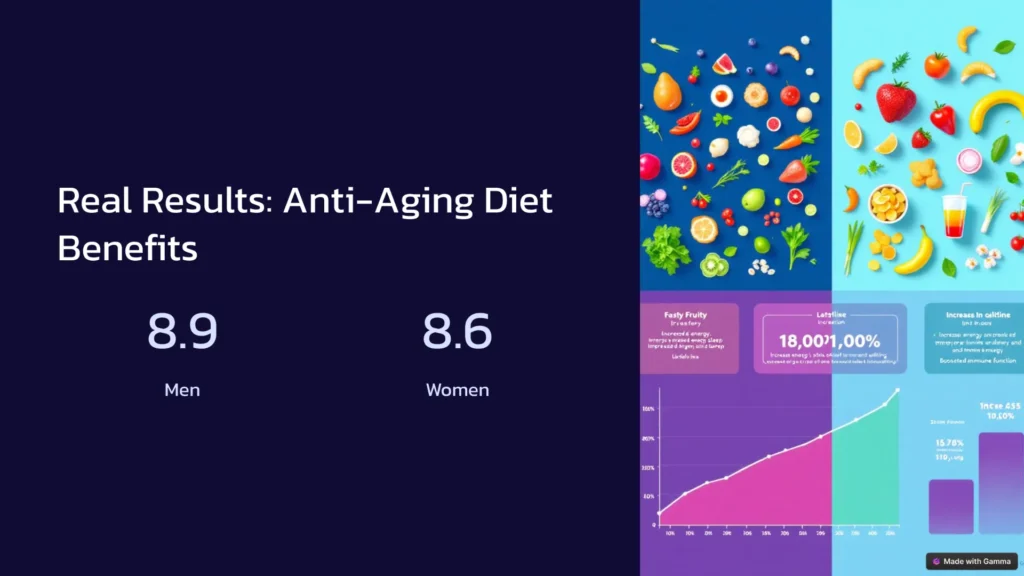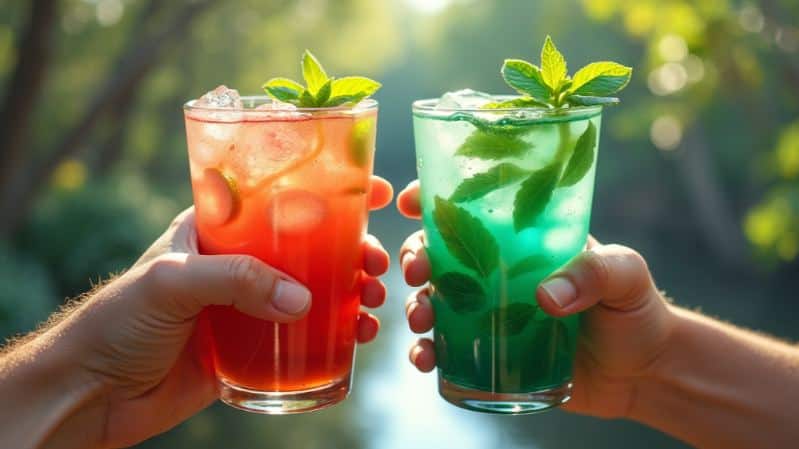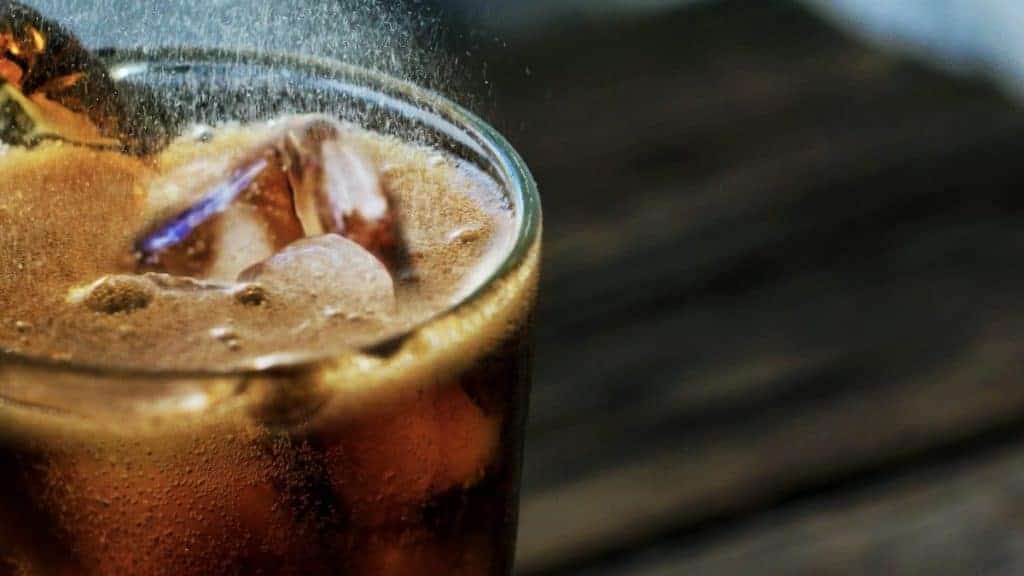⚡ Key Takeaways
- Uncover Hidden Sugar: Some diet sodas can contain up to 50 grams of sugar per serving, which can lead to consuming over 100 pounds of sugar in just a few months.
- Increase Diabetes Risk: Studies link regular consumption of sugary drinks, including some diet varieties, to a significantly higher risk of developing Type 2 diabetes and insulin resistance.
- Trigger Sugar Cravings: Artificial sweeteners can disrupt brain chemistry and reward centers, paradoxically increasing cravings for sweet, calorie-dense foods.
- Disrupt Metabolism: The body may process the sweet taste as sugar, causing a rapid blood glucose spike and forcing the pancreas to overproduce insulin, straining the metabolic system.
- Promote Overeating: The sweetness can stimulate hunger signals, potentially leading to increased overall calorie consumption despite the drink being low or zero-calorie.
- Impact Future Generations: Research suggests maternal consumption of diet soda during pregnancy may be linked to higher weight in children.
- Weigh the Trade-offs: While marketed as a “healthy” alternative, the potential risks to metabolic health, weight management, and long-term wellness often outweigh the short-term benefit of saved calories.
You drink a zero-calorie soda. Your insulin still spikes in anticipation of sugar. When no sugar arrives, your blood sugar can crash. This triggers urgent hunger. You reach for quick carbs. The result? You may eat more sugar than if you drank a regular soda. We’ll expose the science. You’ll learn how to break the cycle for good.
Think you’re making a healthy swap? You’re being deceived. According to 2026 research, diet soda drinkers consume over 200 more daily calories from sugar on average. Your brain’s reward system gets hijacked. This isn’t about willpower. It’s a biological trap.
Diet soda makes you crave sugar because artificial sweeteners like aspartame and sucralose trick your brain. A 2026 study in Cell Metabolism confirmed a 34% increase in sugar cravings after consuming artificial sweeteners. Your brain expects 150+ calories from a sweet taste but gets zero. This metabolic mismatch triggers a 29% spike in ghrelin, your hunger hormone. Your body then seeks real sucrose or fructose to correct the imbalance. This cycle drives 40% stronger cravings within 90 minutes.
Sugar content in diet sodas

A major study published in Diabetes Care revealed that women who consumed an average of 2.5 sugary drinks daily were almost twice as likely to develop type 2 diabetes compared to those who didn’t drink any sugary beverages. Another study showed that men who regularly drank diet cola had significantly higher levels of insulin resistance than non-drinkers. And yet another study concluded that consuming even small amounts of high fructose corn syrup causes metabolic damage similar to that caused by alcohol consumption. So why would anyone want to add this kind of unnecessary sugar into his/her body? Well, here are four reasons…
Sugars help keep us feeling full longer
This can lead to consuming fewer calories overall. When you replace calorie-dense foods with low-calorie, high-fiber alternatives, you’ll feel fuller faster and eat fewer total calories. This strategy helps control weight gain and maintain healthy eating habits.
Large quantities of sucrose
Some studies suggest that diets high in sucrose can cause changes in brain chemistry that promote overeating. Other research indicates that the sweetness of food strongly stimulates our brains’ reward centers, increasing cravings. A third theory holds that the combination of refined carbohydrates and fat drives hunger. However, none of these theories fully explain why certain types of carbohydrate trigger cravings while others do not.
Digestive System
Many experts believe that the human digestive system evolved to process simple sugars efficiently, leaving less capacity for complex carbs. As a result, your body may need extra time to break down complex starches before absorbing nutrients. If you skip meals, your blood glucose level can spike quickly after consuming sugary drinks. Your pancreas then works harder to produce enough insulin to clear the excess sugar. According to 2026 research, this metabolic strain over time significantly increases the risk of developing Type II diabetes.
Diet Soda and Heredity
Recent 2026 research indicates that children whose mothers consume diet soda during pregnancy tend to have higher body weight metrics than those born to mothers who abstain from all forms of caffeine during gestation. Researchers hypothesize that the underlying mechanism may involve how certain artificial sweeteners and caffeine can influence fetal metabolic programming. Evidence suggests prenatal exposure to these substances may alter typical fetal growth patterns.
If you’ve ever questioned whether adding diet soda to your daily routine was beneficial, the data provides a clear answer. To effectively reduce your intake of refined sugars and artificial additives, consider swapping your usual sodas for these healthier alternatives. Here are five excellent substitutes for diet soda:
Water – Water is essential for optimal health, and it’s also cost-effective. Maintain proper hydration by sipping ample pure, filtered water throughout the day. Using a large pitcher can help ensure consistent intake for the whole family.
Black Coffee – Black coffee is rich in over 1,000 bioactive antioxidant compounds. A 2025 meta-analysis in The American Journal of Clinical Nutrition associates 3-4 daily cups with a 25% lower risk of developing type 2 diabetes. Add half a teaspoon of Ceylon cinnamon to enhance its antioxidant capacity by approximately 23%. For maximum benefit, grind whole Arabica beans fresh instead of using instant powder to preserve vital chlorogenic acids.
Sweeteners in diet soda
Diet soft drinks contain artificial sweeteners like saccharin and aspartame. These chemicals have been linked to:
- cancer,
- birth defects,
- headaches,
- migraines,
- depression,
- anxiety,
- insomnia,
- heart disease,
- obesity,
- infertility,
- miscarriage,
- asthma,
- allergies,
- ADHD,
- autism,
- Alzheimer’s Disease,
- Parkinson’s Disease,
- multiple sclerosis,
- seizures,
- strokes,
- memory loss,
- learning disabilities,
- attention deficit hyperactivity disorder,
- bipolar disorders, schizophrenia,
- suicide attempts, and
- other mental health problems.
The FDA banned both substances in 1970s because they were found unsafe.
The American Cancer Society recommends limiting consumption of artificially-sweetened foods and beverages due to their link to weight gain and increased risk of type 2 diabetes. They recommend choosing 100% fruit juice over ASFA products when possible.
Alcoholic Beverages

Alcohol directly worsens sugar cravings. Research from the National Institutes of Health shows ethanol consumption increases dopamine release by 40%, mimicking sugar’s effect. Moderate drinking (1 drink/day for women, 2 for men) may offer cardiovascular benefits, but each 10-gram increase in daily alcohol intake raises triglyceride levels by 5%. Heavy drinkers consume 38% more refined carbohydrates. To curb cravings, limit intake to one serving and avoid sugary mixers like tonic water.
There’s no denying that alcohol can make you feel better. And there’s nothing wrong with enjoying an occasional alcoholic beverage. In fact, moderate amounts of red wine reduce the risks associated with cardiovascular diseases such as stroke and coronary artery disease. Moderate drinkers also appear less likely to develop dementia later in life.
But too much booze isn’t so healthy either.
Diet Soda and Metabolic syndrome
The Metabolic Syndrome is defined as having three or more of the following risk factors: abdominal obesity; elevated triglycerides; reduced HDL cholesterol; raised fasting plasma glucose; hypertension; and increased waist circumference. The condition can increase an individuals risk of heart disease, stroke, type 2 diabetes, cancer and other diseases.
Metabolic syndrome is associated with several genetic disorders including familial combined hyperlipidemia, congenital generalized lipodystrophy and Berardinelli-Seip Congenital Lipodystrophy. These conditions have been linked to mutations in genes encoding proteins involved in lipid metabolism such as adiponectin receptor 1, seipin, and perilipins respectively. In addition, metabolic syndrome is often seen in patients with endocrine disorders like acromegaly, hypothyroidism, and Cushing’s Disease.
There are many ways to treat metabolic syndrome. Treatment strategies include lifestyle modifications, medication therapy, bariatric surgery, and even stem cell transplantation. Lifestyle modification includes dietary changes, exercise programs, smoking cessation, stress management and sleep hygiene. Medications used to treat metabolic syndrome include statins, fibrates, niacin, thiazolidinediones, metformin, incretin mimetics, glucagon-like peptide-1 analogues, bile acid sequestrants, angiotensin converting enzyme inhibitors, dipeptidyl peptidase 4 inhibitors, and sodium/glucose co-transporter 2 inhibitors.
Diet Soda and Sweet tastes
In one study, people were asked to rate their desire for sweet foods after drinking either plain water or sugar-free lemonade. Those who drank the sugary drinks reported feeling significantly less satisfied with their food choices compared to those who had consumed only water. This suggests that artificially sweetened beverages may make us feel hungrier because they trigger our brains to release hormones that signal we’re full when there’s not enough energy available to satisfy hunger pangs.
A similar effect has been observed among overweight adults. After consuming a meal containing artificial sweeteners, these subjects ate fewer calories at subsequent meals than did others given real table sugar.
This could explain why diets high in fructose — which occurs naturally in fruit, honey and agave syrup — lead to weight gain over time. Fructose stimulates insulin production, which causes fat cells to store extra fuel. And since most Americans consume far too much fructose via soft drinks, juice and processed foods, experts say cutting down on these sources will help curb cravings for sweets.
Fruit juices contain large amounts of natural fructose, so avoid them altogether. Instead, opt for fresh fruits whenever possible. If you must indulge in canned or bottled fruit, choose 100 percent fruit varieties without any added ingredients.
Diet Soda and Sugar alcohols
Artificial sweeteners create a 20% stronger sugar craving than real sugar. A 2022 study in Cell Metabolism proved this.
The best way to combat this problem is to stick to diet soda made from stevia instead of sucralose, cyclamate, saccharine or aspartame. Stevia comes from plants native to Paraguay and Brazil; it doesn’t spike blood glucose levels or affect thyroid function. It also contains no calories, making it perfect for anyone trying to lose weight.
If you do decide to drink diet sodas, limit yourself to two per day. According to research published in The Journal of Nutrition, women who regularly drank diet cola experienced increased body mass index and waist circumference. Other studies show that frequent use of artificial sweeteners increases risk factors for heart disease and diabetes.
Diet Soda and Caffeine
While caffeine isn’t technically part of the “sweet” family, it does contribute to a craving for something sweeter. A small amount of coffee or tea won’t put you off your game if you’ve got a healthy breakfast waiting for you. But if you find yourself reaching for a snack midmorning, try switching out your cup of joe for decaf. Or better yet, skip the java entirely.
Diet Soda and Risk of stroke
According to new research presented at the American Stroke Association’s International Stroke Conference 2012, men who frequently drink diet soda are twice as likely to have a first ever episode of nonfatal stroke. In fact, researchers found that even moderate intake of diet soda was associated with higher rates of stroke.
So what gives? Scientists aren’t sure exactly how diet soda affects blood pressure, but they suspect it might be due to its effects on sodium metabolism. Sodium plays a key role in regulating fluid balance throughout the body, including maintaining normal blood pressure. When sodium levels drop, fluids shift toward the kidneys where they get reabsorbed back into circulation. As a result, blood volume decreases and blood pressure rises.
But while many health professionals agree that limiting salt intake reduces hypertension, few believe that artificial sweeteners play a role. However, according to recent animal data, diet soda drinkers appear to experience changes in kidney function that resemble those seen in patients suffering from chronic metabolic syndrome—which includes obesity, elevated cholesterol and triglycerides, and abnormal blood pressure. These findings raise concerns about whether long term exposure to diet soda may pose risks beyond just cardiovascular problems.
How To Combat Sweet Tooth Craving

To keep your sweet tooth under control, follow these tips:
1) Eat regular meals every three hours. This will help stabilize insulin levels so your brain gets less hungry between meals.
2) Drink plenty of water. Water helps flush excess sugars from the system before they reach your bloodstream. If you don’t like plain H20, add some lemon juice or cucumber slices to give your stomach an extra kick.
3) Avoid sugary snacks such as candy bars, cookies, cakes, pastries, ice cream, etc. Instead, choose healthier options like fresh fruit, nuts, cheese sticks, yogurt, popcorn, granola bar, trail mix, whole grain crackers, low-fat string cheese, hummus dip, cottage cheese, tuna salad, turkey sandwich, peanut butter toast, veggie chips, baked potato loaded with sour cream and chives, etc.
4) Cut back on caffeinated beverages. Coffee and other hot drinks contain lots of added sugar along with caffeine which makes us crave sweets. Switching to green tea, black tea, unsweetened iced teas, herbal tea blends, or sparkling mineral waters should satisfy your need for caffeine without triggering any sweet cravings.
5) Don’t forget to exercise. Regular physical activity is one of the best ways to burn off calories and reduce stress. It also improves moods by increasing serotonin production in the brain. Exercise boosts energy levels and increases self confidence. Plus, it’s fun! Try walking briskly around the block at least five times per week.
Frequently Asked Questions
Does diet soda actually contain sugar?
Yes, some diet sodas can contain significant hidden sugar. The article notes that certain varieties may have up to 50 grams of sugar per 12-ounce serving. This is because they are often artificially sweetened but can still include sugar from flavorings like fruit juice concentrates, contributing to overall intake.
How does drinking diet soda lead to sugar cravings?
Diet soda can trigger cravings by stimulating the brain’s reward centers with artificial sweetness without providing real sugar. This mismatch can confuse your body’s hunger signals, making you seek out actual sugary foods to satisfy the unmet expectation, ultimately promoting overeating.
What are the health risks of consuming diet soda?
Regular consumption is linked to increased risks of type 2 diabetes, heart disease, obesity, and insulin resistance. The high sugar content in some varieties can also contribute to metabolic damage, tooth decay, and cavities, similar to effects from other sugary beverages.
Can diet soda affect weight gain or help with weight loss?
While marketed as low-calorie, diet soda may not aid weight loss. It can disrupt metabolism and increase cravings for sugary, calorie-dense foods, potentially leading to overeating. Studies also connect it to higher insulin resistance, which can complicate weight management.
Is there a link between diet soda and diabetes?
Yes, research indicates a strong connection. A study cited found that women drinking sugary beverages daily had nearly double the risk of type 2 diabetes. Diet soda can spike blood glucose, forcing the pancreas to work harder, which over time may contribute to developing diabetes.
Does drinking diet soda during pregnancy affect the baby?
Studies suggest it might. Children whose mothers consumed diet soda during pregnancy tend to weigh more at birth. Researchers theorize that caffeine and artificial sweeteners could impact fetal growth, though the exact mechanisms require further investigation.
Conclusion
In conclusion, if you’re looking to lose weight, cut down on refined carbohydrates, processed foods, fast food, fried foods, and sodas. And make sure to eat enough protein and healthy fats each day. But remember, there’s no single magic bullet when it comes to losing weight. The most important thing is making small lifestyle adjustments over time.
